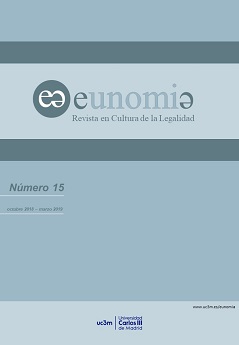Lenguaje claro (derecho a comprender el Derecho)
Resumen
Resumen: Desde hace algunos años se está promoviendo el uso de un lenguaje claro en los textos legales y formales para fortalecer el acceso a la información pública, la confianza en las instituciones, los mecanismos de control social y la certidumbre jurídica. Diferentes asociaciones internacionales y redes nacionales de lenguaje claro se han comprometido con lo que denominan el derecho a comprender la ley y la justicia. Este artículo reseña la construcción conceptual del lenguaje claro, sus orígenes en la teoría de la legislación moderna, su incidencia en las democracias contemporáneas y en las comunicaciones del Estado con sus ciudadanos.
Descargas
Eunomía. Revista en Cultura de la Legalidad es una revista debidamente registrada, con EISSN 2253-6655.
Los textos publicados en esta revista están –si no se indica lo contrario– bajo una licencia Reconocimiento-Sin obras derivadas 3.0 España de Creative Commons. Puede copiarlos, distribuirlos y comunicarlos públicamente siempre que cite su autor y la revista y la institución que los publica y no haga con ellos obras derivadas. La licencia completa se puede consultar en: http://creativecommons.org/licenses/by-nd/3.0/es/deed.es




